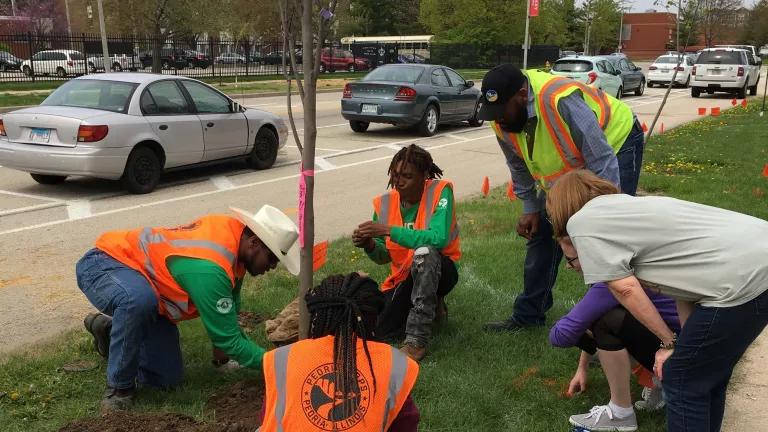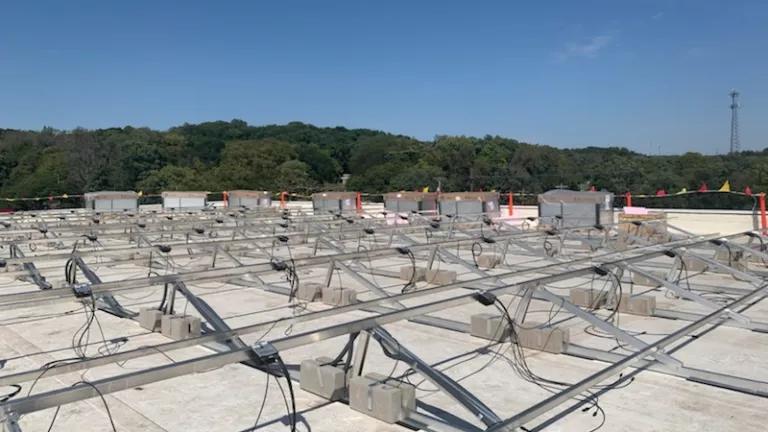PeoriaCorps Green Infrastructure Training Increases Stipend
This is the fourth in a series of blogs celebrating the grant projects funded through our Clean Air Act settlement with the owners of the E.D. Edwards coal-fired power plant outside Peoria, Illinois. The settlement provides for the plant to close by the end of 2022 and makes $8.6 million available for local job training, lung-health, energy-efficiency, solar-energy, and bus-electrification projects.

Members of PeoriaCorps’s third Cohort work alongside Department of Public Works staff to plant a tree in Peoria's West Bluff neighborhood near Bradley University.
This is the fourth in a series of blogs celebrating the grant projects funded through our Clean Air Act settlement with the owners of the E.D. Edwards coal-fired power plant outside Peoria, Illinois. The settlement provides for the plant to close by the end of 2022 and makes $8.6 million available for local job training, lung-health, energy-efficiency, solar-energy, and bus-electrification projects. Each blog features the great work one of the settlement grantees is doing to promote public health and quality of life in the Peoria, Illinois area.
PeoriaCorps, a job-readiness and green infrastructure training Americorps program in Peoria, Illinois, has increased its member stipend from $6.25 an hour to up to $10 an hour thanks to a grant from the Edwards Settlement Fund. PeoriaCorps’s six-month program focuses on job skills through a series of professional development opportunities, including site visits, career pathway presentations, and trade and apprenticeship presentations. PeoriaCorps’s participants—called “members”—can also earn a nationally recognized credential through the National Green Infrastructure Certification Program (NGICP). Nearly 80% of PeoriaCorps members’ time is spent in “active service”: working outside on green infrastructure maintenance and improvements, like weeding, removing fall and winter debris, planting trees, and litter pick-up, throughout the City.
PeoriaCorps was born out of a need to address Combined Sewer Overflows (CSOs) in the City. Like many older cities across the country, Peoria relies on combined sewer systems to manage both its wastewater and stormwater. During rainstorms, excessive stormwater runs into the City’s combined sewers, which causes the sewer waters to rise and spill waste and sewage into local rivers and streams. Because these overflows contain untreated human and industrial waste, toxic materials, and debris, they present major water pollution and public health concerns to the hundreds of cities across the country with combined sewer systems.
Instead of installing an extensive and expensive underground piping system to handle its stormwater runoff, Peoria chose to focus on improving and expanding its green infrastructure as the solution to its CSO problem. Green infrastructure includes a variety of water-management practices that capture, filter, and reduce stormwater runoff. For Peoria, green infrastructure expansion means the creation of more permeable surfaces, including native plants, grasses, and trees, in areas the City is responsible for maintaining. Expanding green infrastructure ensures that as rain falls across the City, more of it percolates into the ground instead of running off into the sewer system and contributing to CSOs.
PeoriaCorps helps meet the City’s green infrastructure goals by contributing to the upkeep, improvement, and expansion of the green infrastructure system. In doing so, PeoriaCorps’ members gain experience working in the green economy and develop a specialized knowledge within the landscaping and stormwater management fields—knowledge they can use to gain professional credentials and kickstart a career in green infrastructure work.

Herman Hobson, Charles Massey, Jr., and JaRyan Norris, members of Cohort 5, complete weed removal in the McArthur bioswale on the Southside of Peoria.
In addition to helping address the City’s stormwater problems, PeoriaCorps also confronts the issue of subjugation in Black communities and the impacts it has on motivation. Jamila Wilson, PeoriaCorps’ Director, is passionate about building confidence and self-worth in PeoriaCorps’ members. Jamila has been in the workforce development field for 20 years and has seen that building confidence is a critical first step to progress in other areas, including job readiness. This is especially important for PeoriaCorps’ members, who are predominantly young Black Peorians from neighborhoods disproportionately impacted by unemployment and poverty. Jamila often talks about the idea of self-efficacy: “when you engage in something difficult, instead of giving up, you keep going.” PeoriaCorps staff work hard to ensure they are mindful of their members’ lived experiences and past traumas and to help them acknowledge their successes as progress.

PeoriaCorps member Jesmon Reed of Cohort 2 reviews materials from the NGICP curriculum in preparation for the exam to earn an industry recognized credential in Green Infrastructure.
PeoriaCorps members receive a stipend, or “living allowance,” as Americorps members. If calculated as a wage, this living allowance would total $6.25 per hour. This does not come close to providing a living wage, and—Jamila found—was often not enough to retain members through the full six-month commitment. We were delighted to provide Edwards Settlement grant funds to increase PeoriaCorps member stipends to up to $10 per hour for the next several years. We hope this keeps members motivated to enroll and complete the program and makes it easier for them to meet their food, housing, and other needs.
In the future, Jamila hopes to expand PeoriaCorps and support the formation of a worker-cooperative green infrastructure firm. Several PeoriaCorps alumni have already expressed interest in owning their own green infrastructure businesses. Jamila also wants to broaden the scope of PeoriaCorps’ work to incorporate urban agriculture. And of course, PeoriaCorps is considering applicants for its next cohort of members. Young Peorians who are motivated about their future are encouraged to apply. Because much of PeoriaCorps members’ work is in Peoria’s under-resourced neighborhoods, the program gives priority to residents of those neighborhoods, who will be able to maintain the work and advocate for green infrastructure in those parts of Peoria.
Learn more about other settlement-funded projects: a solar array on Peoria’s Romain Arts and Culture Community Center; the expansion of a job-assistance program run by Peoria’s Jubilee Ministries; and the electric buses that two Peoria-area school districts have added to their fleets.




